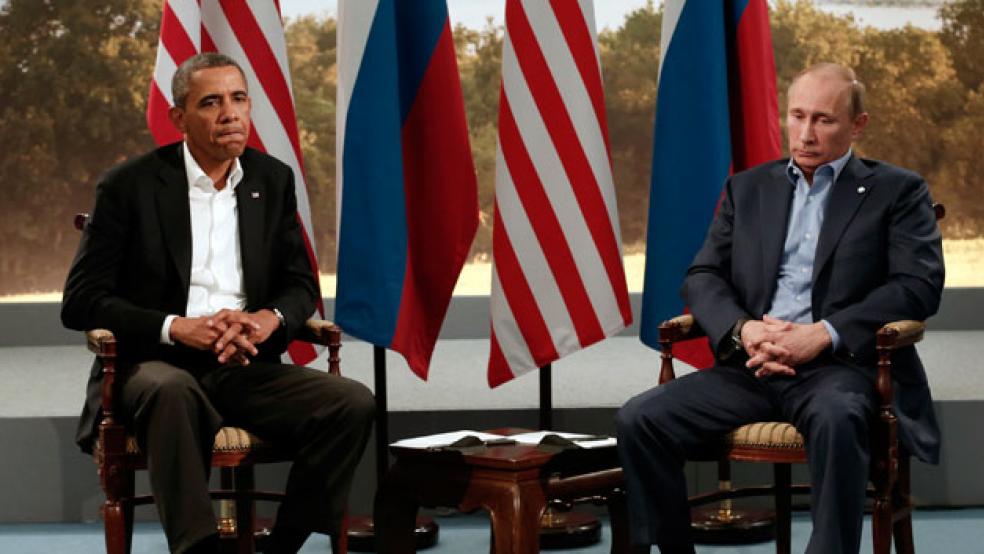The West could hit Russia with even tougher sanctions if it turns out the Malaysia Airlines passenger plane was shot down by separatist rebels, analysts said on Friday.
"The U.S. clearly would like Western investors to listen and understand that the sanctions regime can get much worse unless Russia changes its actions," Timothy Ash, head of emerging market research (excluding Africa) at Standard Bank, wrote in a research note.
So far, the Ukrainian government and pro-Russian rebels fighting in the region have denied responsibility for the shooting down of the Malaysia Airlines Boeing 777 on Thursday. The passenger jet crashed with 298 people on board after it was hit by a surface-to-air missile, according to U.S. officials.
Related: Did Russia Just Push the World to the Brink of War?
Earlier this week, the U.S. and the European Union intensified sanctions against Russia—the latest in a series of penalties for Moscow's role in destabilizing Ukraine. Companies sanctioned by the White House included energy giants Rosneft and Novatek, as well as two banks and eight defense firms.
The current sanctions will not freeze the Russian firms' assets nor prohibit most transactions with them, but will prevent them from tapping U.S. equity or debt markets for new financing with a maturity beyond 90 days.
Russian President Vladimir Putin responded on Thursday by saying that relations between the U.S. and Russia were nearing a "dead end," which could damage U.S. business interests in his country, according to reports. Reuters also cited the Russian Foreign Ministry on Thursday morning as saying that it would not tolerate "U.S. sanction blackmail" and reserved the right to retaliate.
Wednesday's sanctions built on the visa bans and asset freezes imposed earlier in the year. A number of Russian and Ukraine oligarchs with close ties to Putin have been sanctioned, with their U.S. assets blocked and U.S. citizens barred from doing business with them. Those hit include Rosneft Chief Executive Igor Sechin and Sergei Chemezov, the CEO of state-owned high-tech manufacturer Rostec.
However, European officials have been wary of instigating too-strict sanctions against Russia, because the region is dependent on Russian energy supplies—the EU imports around 30 percent of its gas from the country. The EU did not join the U.S. on Wednesday in imposing sanctions against specific Russian companies or banks, but merely halted lending to Russia from European pan-governmental bodies.
Now, analysts believe the U.S. may use the airline tragedy to push Europe to change its softer stance.
"If there is evidence linking Russia to this, that should inspire the Europeans to do much more on three counts," Hilary Clinton, the former U.S. secretary of state, said on the U.S. "Charlie Rose" television interview show on Thursday.
"One: toughen their own sanctions, making it very clear there has to be a price to pay. Number two: immediately accelerate efforts, and announce they are doing so, to find alternatives to Gazprom… And thirdly: do more in concert with us to support the Ukrainians."
Some officials, like Swedish Prime Minister John Fredrik Reinfeldt, are pushing Europe to instigate tougher sanctions on Russia, which would hit an unspecified "broad range of economic areas". In March, the European Council said these would be enforced if Russia took any further steps to destabilize the situation in Ukraine. Other suggestions include halting all weapons and defense deliveries to Russia.
Standard Bank's Ash said: "Prudence might suggest that foreign investors in Russia and in Russian assets look to reduce exposure—if subsequently you get hit by further sanctions then your loss/stupidity, and try explaining that to end-investors."
Related: Obama’s Stealth Sanctions Against Russia Are a Dirty Trick
Nicholas Spiro of Spiro Sovereign Strategy noted that Russia assets—which had been benefiting from perceptions that the Ukraine crisis was ameliorating—were again under strain. The benchmark Moscow stock index was down 1.4 percent on the day on Friday and 5.3 percent on the week.
Stocks hit worst included airline Aeroflot, which was down 3.2 percent on the day.
"It is possible that markets, which continue to brush off all sorts of country-specific and geopolitical risk events after brief periods of nervousness, will perceive the MH17 crash as a development which forces Russia to change course and disassociate itself from the separatist insurgents in eastern Ukraine," Spiro said in a research note on Friday.
"This looks like wishful thinking for the time being."
This article originally appeared in CNBC.
Read more at CNBC:
- Why was Malaysia Airlines MH17 flying over Ukraine? Time, money
- Gaza, MH17 put Wall Street on edge: Cashin
- MH17, Gaza: How foreign policy will impact the 2016 election



